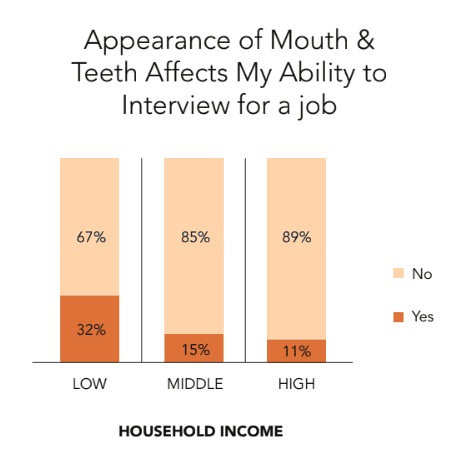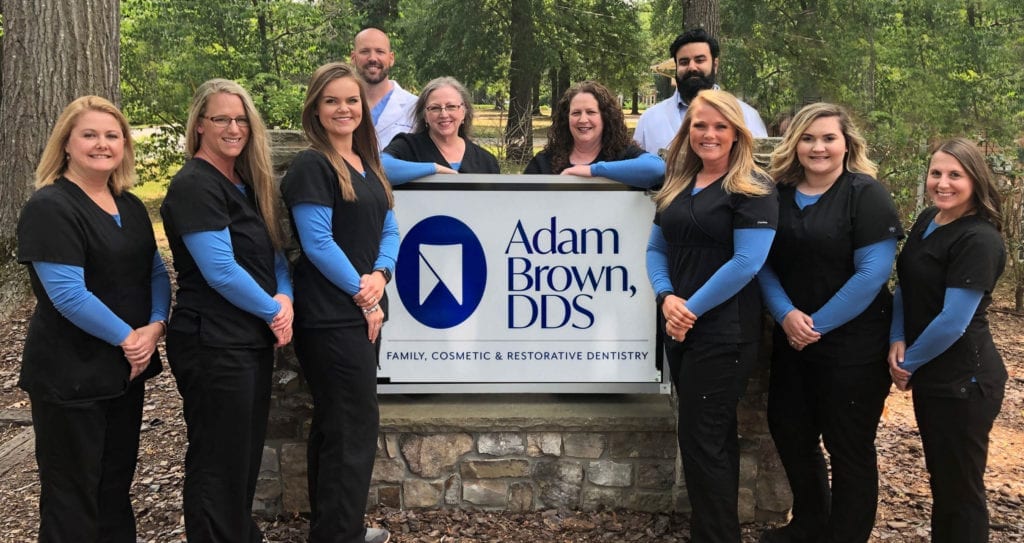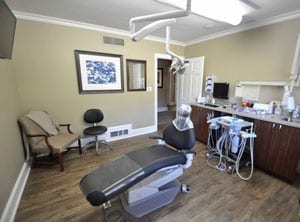Why Dental Implants May Be the Right Choice for Your Oral Health
Carolina’s Dental Choice is committed to the philosophy of restorative dentistry, which is reproducing or repairing teeth and adjoining bones and tissue, through the use of metal and ceramic materials. Though dental implants have been around, in some form, for more than 40 years, it’s surprising how many people today don’t know the procedure is an option to replace a missing tooth or even multiple teeth. Implants are the closest in comparison to natural teeth. They are just as secure, long lasting, and easy to manage.
DENTAL IMPLANTS AND HOW THEY WORK
An implant is a titanium “root” which is placed into the jawbone in order to support a crown, bridge or denture. Ceramic crowns, onlays or veneers address the appearance of the “new tooth.” Over time, the human body completes the process, by growing bone and tissue around the tooth. This provides the artificial implanted tooth with even more stability and permanence.
Treatment generally is a three-part process that takes several months, according to the American Dental Association:
Step 1) The dentist surgically places the implant in the jaw, with the top of the implant slightly above the top of the bone. A screw is inserted into the implant to prevent gum tissue and other debris from entering. The gum then is secured over the implant. The implant will remain covered for approximately three to six months while it fuses with the bone, a process called “osseointegration.” There may be some swelling, tenderness or both for a few days after the surgery, so pain medication usually is prescribed to alleviate the discomfort. A diet of soft foods, cold foods and warm soup often is recommended during the healing process.
 Step 2) The implant is uncovered and the dentist attaches an extension, called a post, to the implant. The gum tissue is allowed to heal around the post. Some implants require a second surgical procedure in which a post is attached to connect the replacement teeth. With other implants, the implant and post are a single unit placed in the mouth during the initial surgery. Once healed, the implant and post can serve as the foundation for the new tooth.
Step 2) The implant is uncovered and the dentist attaches an extension, called a post, to the implant. The gum tissue is allowed to heal around the post. Some implants require a second surgical procedure in which a post is attached to connect the replacement teeth. With other implants, the implant and post are a single unit placed in the mouth during the initial surgery. Once healed, the implant and post can serve as the foundation for the new tooth.
Step 3) The dentist makes a crown, which has a size, shape, color and fit that will blend with your other teeth. Once completed, the crown is attached to the implant post.
TOP ORAL CARE TIPS FOR DENTAL IMPLANTS
Dental implants can be an option at just about any age, as long a patient has healthy gums and adequate bone to support the implant and is committed to maintaining basic oral care. Implants do not require any further care than one would provide for natural teeth, such as rinsing, flossing, and brushing a few times a day.
“Dental implants are very successful and long lasting but as with any surgical procedure, there might be complications,” writes Dr. Anveeta Agarwal, a consultant oral pathologist. “The best way to avoid dental implant failure is to make sure you practice good dental hygiene and visit your dentist regularly for dental check-ups and cleanings.”
Dental implant care tips include:
Practice good oral hygiene – brush twice a day and floss once daily. Using interdental brushes, brushes that slide between teeth, can help clean the hard to reach areas around your implant.
- Quit smoking – smoking can weaken the bone structure and can contribute to implant failure.
- Visit your dentist – cleanings and exams every six months can help ensure your implant is in good condition, and that it stays that way.
- Avoid chewing on hard foods – don’t chew on hard items such as ice and hard candy because they can break the crown and your natural teeth.
The American Dental Association considers two types of implants to be safe. They are:
Endosteal implants — these are surgically implanted directly into the jawbone. Once the surrounding gum tissue has healed, a second surgery is needed to connect a post to the original implant. Finally, an artificial tooth (or teeth) is attached to the post-individually, or grouped on a bridge or denture.
Subperiosteal implants — these consist of a metal frame that is fitted onto the jawbone just below the gum tissue. As the gums heal, the frame becomes fixed to the jawbone. Posts, which are attached to the frame, protrude through the gums. As with endosteal implants, artificial teeth are then mounted to the posts.
Though some patients may be reluctant to undergo dental surgery — as well as the idea of having titanium pieces implanted to the jaw — dental implants offer a viable tooth replacement option when other attempts have failed. Patients may have tried bridges or dentures and been unhappy with the results, but dental implants are a healthy alternative.
“For some people, ordinary bridges and dentures are simply not comfortable or even possible, due to sore spots, poor ridges or gagging,” states Colgate. “In addition, ordinary bridges must be attached to teeth on either side of the space left by the missing tooth. An advantage of implants is that no adjacent teeth need to be prepared or ground down to hold your new replacement tooth/teeth in place.”
Additionally, implants serve a cosmetic function. Missing teeth may impact a person’s ability to get a job.

“Poor oral health can significantly diminish quality of life in a number of ways – the most obvious being a person’s ability to eat, sleep and speak,” according to a 2016 report from the North Carolina Oral Health Collaborative. “However, there are also social and economic consequences that can impact a person’s job readiness and performance, and ultimately the economic stability of communities. A survey of North Carolina adults revealed that the impact of oral health on job readiness is greatest among those from low-income households.”
DENTAL IMPLANTS AND COST
Because dental implants can be used for one or more teeth, and the replacement teeth can vary in size and complexity, assigning a cost-point for the procedure can be challenging. At Carolina’s Dental Choice we usually see prices fluctuating anywhere from the $1,000 to the $3,000 range. Before making any final decisions on payment though, it is a good idea for a potential patient to consult with a dental practice and insurance company in order to clarify how much of the cost may be covered.
At Carolina’s Dental Choice we provide information about payment, including insurance, Medicaid, and our in-house saving program online, and we are happy to discuss this information with you in person or over the phone.
OTHER OPTIONS TO DENTAL IMPLANTS
In addition to dental implants, Carolina’s Dental Choice offers traditional dentures, bridges, partials, which replace teeth. Cosmetic options we offer include teeth whitening and veneers, which are porcelain and permanently bonded to your natural teeth. They can enhance tooth shape, color, length and size. Dental bonding repairs teeth with a tooth-colored resin (stable plastic material) that enhances your smile and can be done in one quick and easy visit.
CAROLINA’S DENTAL CHOICE IS HERE FOR YOU
It is our practice to have private consultations with our patients to discuss your teeth, your options, and your treatment. Our dental practice embodies family dentistry by treating our patients like family and working with you to make you smile!
You may find information including new patient forms on our website. Contact us today at 704.239.9519 to schedule your appointment!



 t Are Dental Implants
t Are Dental Implants  he initial appointment your Carolina’s Dental Choice Dentist will exam your teeth. Along with discussing the procedure, your dental history will be reviewed, x-rays will be taken, and your teeth will be thoroughly examined. You will have the opportunity to discuss your options for implants to determine if you are a good candidate. This will get you acquainted to the different procedures and help you and your doctor decided which option is the best fit for you.
he initial appointment your Carolina’s Dental Choice Dentist will exam your teeth. Along with discussing the procedure, your dental history will be reviewed, x-rays will be taken, and your teeth will be thoroughly examined. You will have the opportunity to discuss your options for implants to determine if you are a good candidate. This will get you acquainted to the different procedures and help you and your doctor decided which option is the best fit for you. The great thing about dental implants is that they require very little patience and if they are taken care of, implants will never have to be replaced. The upkeep of implants is very easy and requires very little of your time. Steps to keeping your implants successful include:
The great thing about dental implants is that they require very little patience and if they are taken care of, implants will never have to be replaced. The upkeep of implants is very easy and requires very little of your time. Steps to keeping your implants successful include: